“Things are not quite so simple always as black and white.”
~ Doris Lessing
Frequently Asked Questions
When we embark on a healing diet, the hope is that we can reverse our autoimmune disease, heal our bodies at a deep level, regain abilities, and reduce or eliminate our need for medication. But that’s not something that happens overnight. Today, I’m answering the most common questions people ask about medications and the Paleo Autoimmune Protocol.
Should I Go Off My Medications When I Start the Diet?
The short answer is No. Healing through diet and lifestyle takes time, and if you go off your medication before your body has a chance to heal, you will most likely have an autoimmune flare. I’ve interviewed a number of healthcare practitioners and paleo leaders, and they all agree on this point. The one exception might be people who start a healing diet immediately after diagnosis, before going on medication. Sometimes it’s possible to avoid meds at this stage, but not always. Work closely with your doctor when making this decision, because when when autoimmune disease is active, it can cause permanent damage to your body. Dr. Sarah Ballantyne sums it up in her book, The Paleo Approach:
“Changing, tapering, or discontinuing your medication – especially if you are taking prescription drugs, but also any daily over-the-counter medication that your doctor may have recommended – should, without exception, be done under the supervision of a health care professional. I must also emphasize that changing your medication is not, in most cases, something to tackle when you initially adopt the Paleo Approach. By improving your diet and addressing lifestyle factors first, you will be able to heal your body as much as you can while you are still taking these drugs, which will significantly help you adjust to discontinuing them.”
~ Dr. Sarah Ballantyne
What About NSAIDs?
You may think these are never allowed on the Paleo Autoimmune Protocol (AIP), since they are often included on the “No” lists, and the science is clear that they do contribute to leaky gut. If you can find a supplement that works just as well, that’s ideal. However, if you are prescribed NSAIDs by your physician to specifically treat your autoimmune pain (like rheumatoid arthritis) and supplements don’t provide adequate pain relief, going off NSAIDs cold-turkey will usually lead to high levels of pain, which isn’t a healing state either. Follow Sarah Ballantyne’s advice above. Implement diet and lifestyle recommendations first, and as your symptoms improve and your pain lessens, work with your doctor to reduce/eliminate your dose.
How Long Does It Take to Reduce Medications?
This varies, depending on the medication, and the individual. Your symptoms need to go away before your medication does.
According to Dr. Terry Wahls, some of the first prescriptions people are often able to reduce are blood pressure and blood sugar medications. Many people also find their need for acid reflux medication disappears when they start a healing diet. But when it comes to autoimmune medication, that usually takes longer. Wait until you see significant improvement in your autoimmune symptoms and then work with your doctor on prioritizing which medications to reduce first.
Steroids are meant to be taken short-term to control autoimmune flares, and they’re a good first choice to try eliminating once your flares have stopped. However, you’ll want to slowly taper your dose under a doctor’s supervision, to minimize any rebound effect.
DMARDs (immunosuppressants) are designed to be taken long-term and many are often prescribed simultaneously. Some people have been able to get off DMARDs altogether, while others have been able to reduce their numbers and dosage over time.
If you have Hashimoto’s or Addison’s disease, your need for medication will depend on how much damage has been done to your glands. We need the hormones from our thyroid and adrenal glands to function, and when those glands are damaged, they stop producing enough. Some people are diagnosed before much damage occurs, and they are able to remain (or become) medication-free. Others are diagnosed after many years of damage, and therefore medication is needed long-term. If that is you, the key is finding the right brand and dose that works best for you.
Lastly, sex hormones can affect autoimmune expression. For that reason, if you are taking birth control or hormone replacement therapy, and you hit a healing plateau, you might want to look into non-hormonal alternatives. And if your hormones are out of balance, work with a practitioner to help you restore balance and remove this roadblock to healing.
If your doctor is resistant to the idea of dietary healing and won’t discuss the possibility of reducing your medications, here is a list of directories of paleo practitioners.
If I Can’t Get Off My Meds, What Am I Doing Wrong?
Autoimmune disease is serious business. It often requires medical intervention to prevent disability, treat excruciating pain, and even save lives. While the side effects can be scary (which is why it’s natural to want to get off medication), living with the symptoms of an untreated autoimmune disease is even scarier. There is no shame in taking medication. People who go off their medication aren’t superior to those who don’t. They’re often just luckier. The truth is – some people’s illness is more aggressive than others. I personally started immunosuppressant medication in 2016.
Does that mean you should give up? No.
To maximize the healing impact of the Paleo Autoimmune Protocol, read this article: Top 5 Mistakes People Make on the AIP. Many people are unknowingly skipping a key element to this healing protocol. However, if you’ve read that article and aren’t making those mistakes, you might have other factors interfering with your ability to heal. At that point, it’s time to seek the help of a skilled functional medicine practitioner to do some troubleshooting.
If you’ve done all of that and you still have symptoms, know this: You are NOT a failure. Medication and diet don’t have to be mutually exclusive. In fact, they can work very well together. A nutrient-dense paleo diet reduces inflammation at a root level, allowing your medication to work better. Diet also often addresses symptoms your medication can’t. Many people achieve remission through this combination, when diet alone (or medication alone) wasn’t enough. Lastly, the paleo diet removes much of the toxic burden put on your body, making it easier to tolerate medication. Many people find their side effects minimize or disappear altogether after switching to a real-food diet.
No matter what, you are awesome! If you are part of this community, you’re willing to take your health into your own hands and mindfully choose what you eat and how you live, in an effort to get better.
Some people ask, “If I can’t get off all of my medications, what’s the point?” The point is that you are addressing your autoimmune disease at its root, helping to prevent further damage, reclaiming abilities you thought you had lost, and reducing what medication you can. That’s a lot! Perfection isn’t the only definition of success.
You May Also Be Interested In
A version of this post originally appeared as a guest post for Autoimmune Wellness.
Credit: image at top of page from Pixabay.

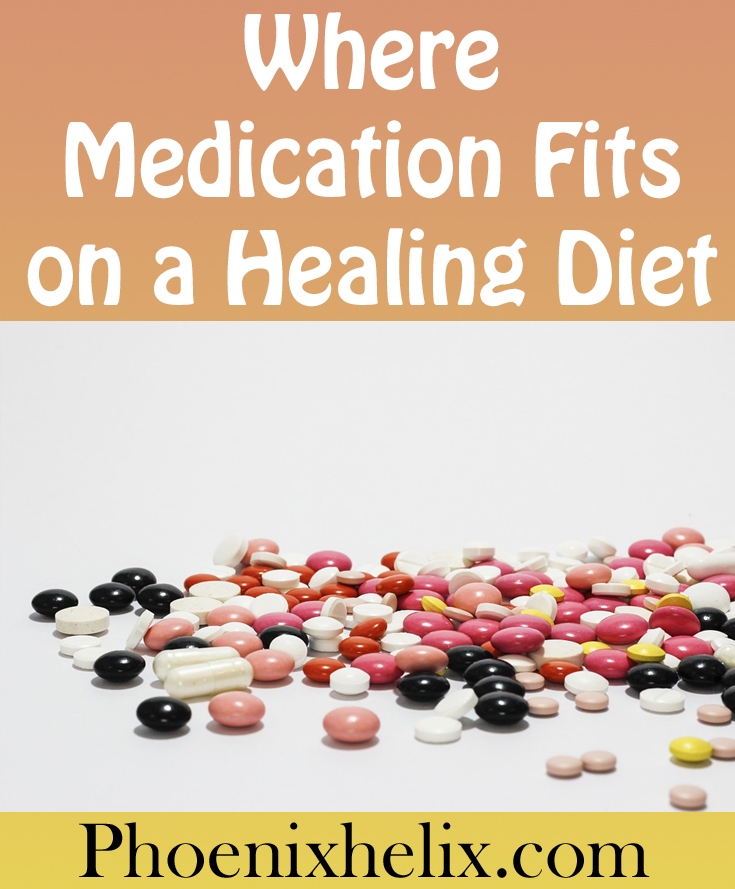
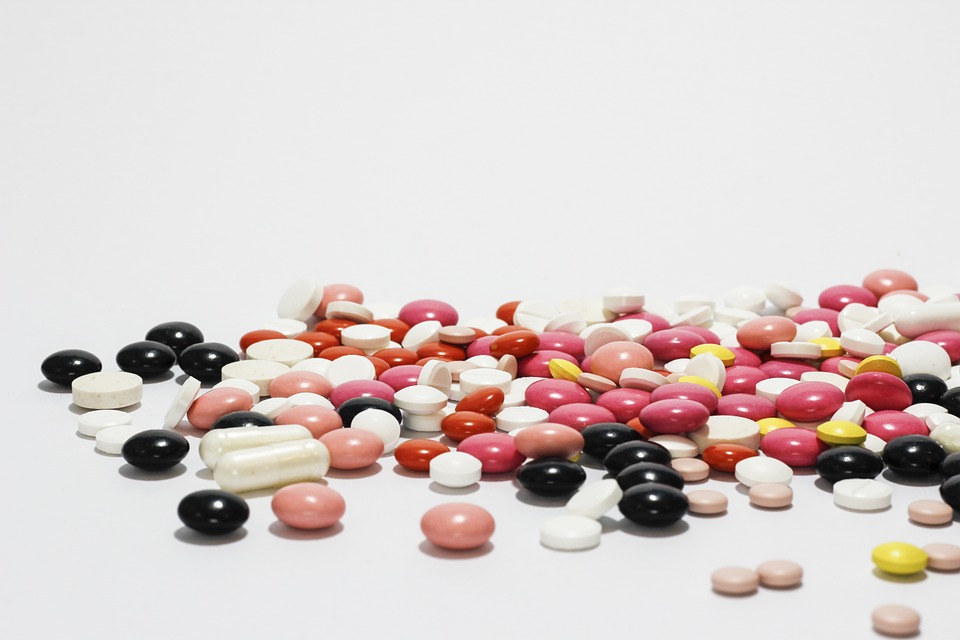
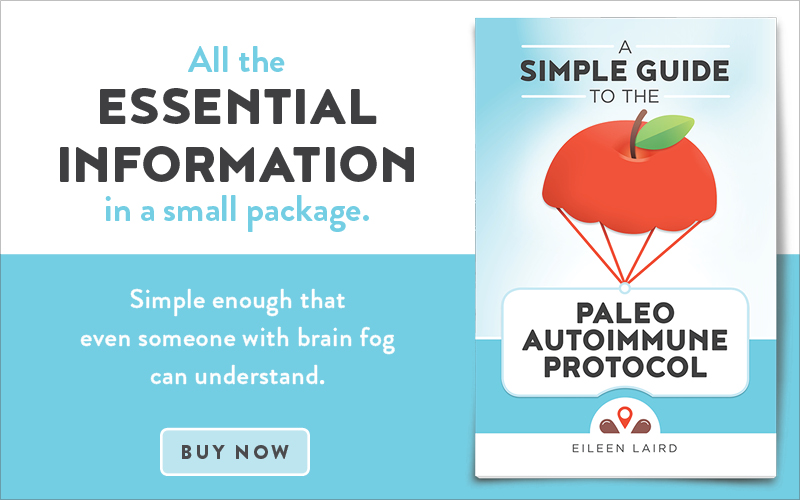
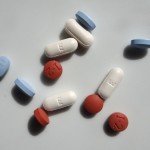


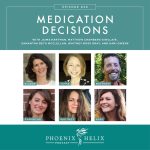
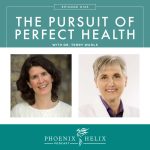


I have gone from 13 scrips to 0. Have not taken so much as an Advil in 5yrs BUT I have 2 hernias that are getting worse. I have put off surgery bc of all the antibiotics and crap they put in your body during surgery. Disrupting the gut health, etc.
Hi Anne. While I can’t give you medical advice, it’s my understanding that antibiotics are given during surgery to save your life. The skin barrier is our ultimate protection against infection. When that is cut during surgery (a necessary step), the antibiotics given are also a necessary step. I have had surgery and happily took the antibiotics, because I knew the benefit outweighed the risk. However, I didn’t accept any hospital food, instead having my husband bring me my meals that I had ordered in advance from Paleo on the Go. I also worked on building up nutrient-density and gut health both before and after surgery, to make my recovery as smooth as possible. While it’s good to avoid taking antibiotics unnecessarily, it’s important not to let fear of them prevent us from getting medical care we need. That’s my personal opinion, anyway. Whatever you decide, I wish you wellness in every way. Here’s a good article from Dr. Sarah Ballantyne on antibiotics: https://www.thepaleomom.com/recovery-from-antibiotics/. And if you subscribe to my podcast, I have an episode scheduled to go live on August 6th that’s going talk about preparing for surgery, staying paleo while in the hospital, and recovering from surgery. So, there will be lots of good advice shared in that episode.
Hi Eileen, thank you so much for this post! I have RA and have been on AIP for 6 months. Unfortunately I’ve had to start methotrexate in addition to the biologic I was already taking since being on AIP. It’s easy to get discouraged and feel like AIP isn’t working for me, but hearing your experience helps so much. Thank you for being so forthcoming in your journey. In your opinion, would you suggest continuing to hold off on reintroductions until I could maybe get off of one of the drugs? I’m confused about what to do with reintroductions, since Im not sure if it’s AIP, the meds, or both helping me to feel better. So I’m not sure how I will be able to tell if I have a reaction to foods, but I also don’t want to stay in the elimination phase forever if I don’t have to.. I know you can’t offer medical advice, but I guess I just want a little more direction on whether or nor I should continue strict AIP or if it’s okay to test certain foods. Thank you again for all that you do in this community!
Hi Becca. There are 2 things to consider when it comes to reintroduction timing: (1) You want to control the variables. So, you definitely don’t want to start reintroductions at the same time you started a new medication, because you’re right that you won’t be able to know what’s causing what. (2) You want to see enough clear improvement in your autoimmune symptoms that you have a baseline for testing food reactions. My recommendation is to wait at least 2 months so you can see the impact methotrexate is having on your symptoms. Then, since you will have been AIP for 8 months at that point, I think it would be great for you start your reintros using my ebook as a guide. However, your symptoms need to be somewhat stable. For example, if you’re flaring every day, you won’t be able to discern food reactions. But it your pain is much better and your flares have become rare, most people are able to tell – even on medication – which foods are and aren’t inflammatory during the reintroduction process. One last piece of advice: when diet + medication doesn’t seem to be working, it’s a good idea to do some troubleshooting. Sometimes something else – like an infection – can be driving the autoimmune process and getting that treated makes a big difference. Here’s an article to keep in mind, if you need it in the future: How To Find a Good Functional Medicine Practitioner. Wishing you remission in your near future!